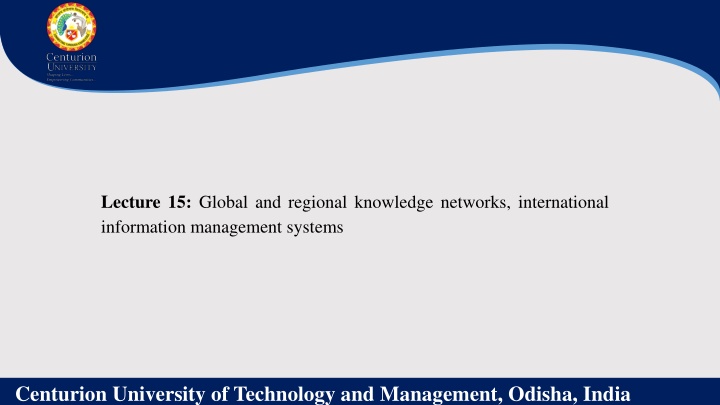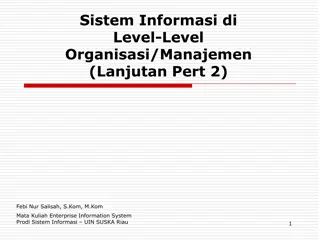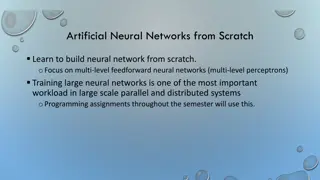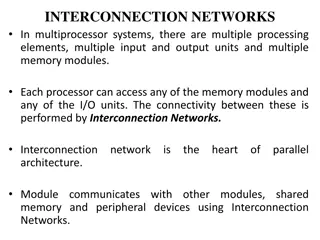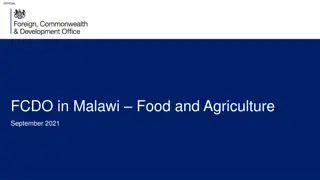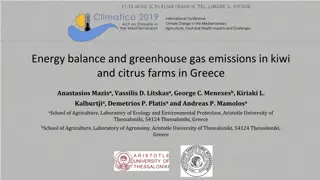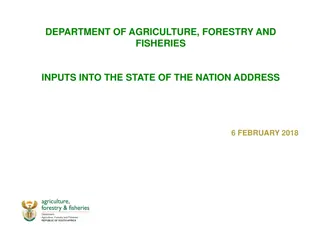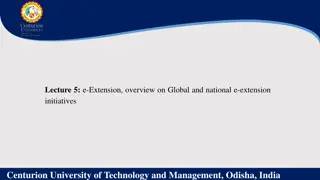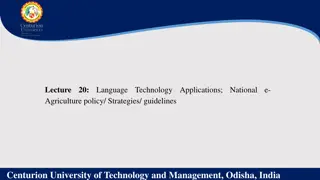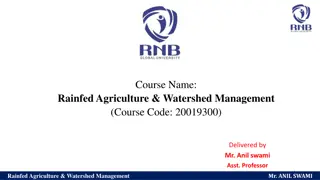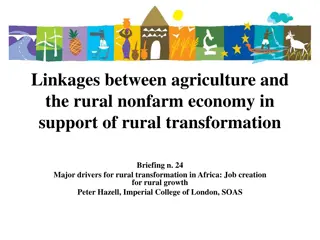Enhancing Agriculture Through Global Knowledge Networks and Information Management Systems
Global and regional knowledge networks play a vital role in agriculture by facilitating information sharing, collaboration, capacity building, and coordination among stakeholders. These networks improve access to information, foster collaboration, enhance capacity building, and strengthen coordination in the agricultural sector. International information management systems, such as AGRIS, are key for sharing best practices globally. Examples like GFAR, CCAFS, IFAD, and RAIN demonstrate the importance of such networks in promoting sustainable agricultural practices.
Download Presentation

Please find below an Image/Link to download the presentation.
The content on the website is provided AS IS for your information and personal use only. It may not be sold, licensed, or shared on other websites without obtaining consent from the author.If you encounter any issues during the download, it is possible that the publisher has removed the file from their server.
You are allowed to download the files provided on this website for personal or commercial use, subject to the condition that they are used lawfully. All files are the property of their respective owners.
The content on the website is provided AS IS for your information and personal use only. It may not be sold, licensed, or shared on other websites without obtaining consent from the author.
E N D
Presentation Transcript
Lecture 15: Global and regional knowledge networks, international information management systems Centurion University of Technology and Management, Odisha, India
Global and regional knowledge networks for agriculture are important for sharing information and best practices between farmers, researchers, and other stakeholders. These networks can help to improve agricultural productivity, sustainability, and resilience. Some of the benefits of global and regional knowledge networks for agriculture include: Improved access to information: Knowledge networks can provide farmers with access to information on new technologies, best practices, and market trends. This can help farmers to improve their productivity and profitability. Increased collaboration: Knowledge networks can facilitate collaboration between farmers, researchers, and other stakeholders. This can lead to the development of new technologies and practices that can benefit the agricultural sector. Enhanced capacity building: Knowledge networks can provide training and capacity building opportunities for farmers and other stakeholders. This can help to improve the skills and knowledge of those involved in the agricultural sector. Strengthened coordination: Knowledge networks can help to strengthen coordination between different stakeholders in the agricultural sector. This can lead to more efficient and effective use of resources. Centurion University of Technology and Management, Odisha, India
Examples The Global Forum for Agricultural Research (GFAR): GFAR is a global network of agricultural research organizations. It aims to promote collaboration and coordination between agricultural research organizations around the world. The CGIAR Research Program on Climate Change, Agriculture and Food Security (CCAFS): CCAFS is a global research program that aims to help farmers adapt to climate change. It brings together researchers from around the world to work on developing climate-resilient agricultural practices. The International Fund for Agricultural Development (IFAD) Knowledge Platform: IFAD's Knowledge Platform is a global network of agricultural experts. It provides information and resources on a wide range of agricultural topics. The Regional Agricultural Information Network (RAIN): RAIN is a regional network of agricultural information centers in Asia and the Pacific. It provides access to agricultural information and resources for farmers and other stakeholders in the region. Centurion University of Technology and Management, Odisha, India
International information management systems in agriculture are essential for sharing information and best practices between farmers, researchers, and other stakeholders around the world. These systems can help to improve agricultural productivity, sustainability, and resilience. There are a number of different international information management systems in agriculture. Some of the most well-known systems include: AGRIS: The International Information System for the Agricultural Sciences and Technology (AGRIS) is a global bibliographic database of agricultural literature. It is maintained by the Food and Agriculture Organization of the United Nations (FAO). Centurion University of Technology and Management, Odisha, India
CARIS: The Collaborative Agricultural Research Information System (CARIS) is a global agricultural information system that provides access to agricultural research data and information. It is maintained by the CGIAR System-wide Information Network (SINET). FAOSTAT: The FAOSTAT database is a global database of food and agricultural statistics. It is maintained by the FAO. SAGIR: The System-wide Agricultural Genetic Resources Information Network (SAGIR) is a global network of agricultural genetic resources information systems. It is maintained by the CGIAR. Centurion University of Technology and Management, Odisha, India
